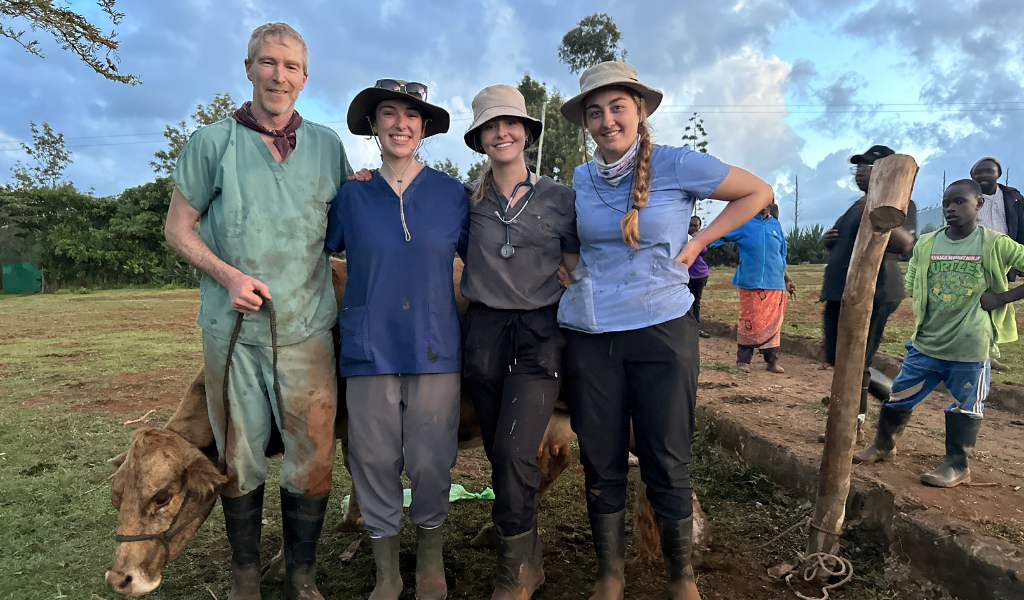AVC faculty and vet students improve lives of people and animals in Kenya

Earlier in January, four fourth-year doctor of veterinary medicine students from the Atlantic Veterinary College (AVC) at the University of Prince Edward Island (UPEI) packed their bags—and their years of education—and headed off for an unforgettable experience more than 10,000 kilometers away.
The students travelled to Meru County, Kenya, where they worked with smallholder farmers to enhance the health, productivity, and living conditions for dairy cattle and donkeys.
Kaitlyn Ledgerwood, Kaitlin Coles, and Meghan Martell were the successful applicants of the International Livestock Health Management fourth-year clinical rotation course in Kenya. Through this collaboration between AVC, UPEI, and Farmers Helping Farmers, the students participated in a three-week rotation that they have been dreaming of for years.
“I heard about this rotation before I was in vet school,” said Ledgerwood. “I was hopeful I would be chosen when the time came, and it’s just crazy that I’m actually going.”
“To experience a new culture and meet new people,” said Coles about what thrilled her about her experience. “And to work with cattle that have some similar and some different diseases than what we see here. I’m excited about everything.”
While Martell have had all the material items she needed for the trip, she admitted that despite three pre-departure orientation sessions, she felt like she was stepping into the unknown and worked to prepare herself mentally for the trip.
“I did a lot of research about what to expect on the farms and chatted with students who went for the internship. I think nothing really prepares you until you get there and see what it is.”
2024 signifies the 20th year that AVC students have traveled to Kenya to work on the International Livestock Health Management rotation project in Kenya, led by Dr. John VanLeeuwen, professor of epidemiology and ruminant health management at the AVC. Over the years, the program has led to proven increased milk production and disease control, improvements in crop farming; empowerment of women who form the majority of smallholder farmers; and enhanced nutrition and education of farm families. Dr. Caroline Ritter, Canada Research Chair in Social Epidemiology for Healthy Animals and an assistant professor at AVC specializing in farmer motivation issues, joined the team to provide advice on how to motivate the Kenyan smallholder dairy farmers.
Dr. Martha Mellish, AVC assistant professor and an equine veterinarian, spearheaded a separate project that focused on the health and welfare of donkeys in Kenya, specifically the health impacts of the current harnessing methods used by donkey owners.
Mellish, drawing from her own experience in the Kenya rotation in 2005 when she was a vet student, was excited to guide student Anya Floyd, an assistant on the donkey project.
“Traveling to a developing country certainly makes you appreciate how much material things you have in Canada,” said Mellish. “That experience makes you take a step back and wonder if you need all of this ‘stuff’ we have in Canada.”
“We’ve just spent four years receiving a lot of education,” said Floyd. “I was excited to be on the other side of that relationship now, helping to educate the people and owners in Kenya.”
VanLeeuwen attested to the life-changing nature of the experience, both personally and professionally. “The four students saw firsthand the difference in animal care between the two countries,” he said. “The animals we treated in Kenya mean a whole lot to that smallholder farmer because they only have a handful of animals, and they rely on each and every one of them for their livelihood.”
The team’s activities included walk-in clinics where they administered dewormer to cattle and donkeys and conducted health checks on animals. On the days without walk-in clinics, the team travelled to farms, where they provided clinical services (health management for sick animals) and continuing education to local animal health personnel and farm owners. Last year, a record 420 farmers received these services from the AVC team.
“This project provided a massive impact to those we’re serving,” said VanLeeuwen. “For these four students, this experience will stay with them their entire life.”
The Kenyan program is made possible thanks to financial support from the Canadian Queen Elizabeth II Diamond Jubilee Scholarships and Global Affairs Canada; product support from Merck, Boehringer-Ingelheim, Bimeda, and Vetoquinol, and private donations from former AVC students and other supporters.